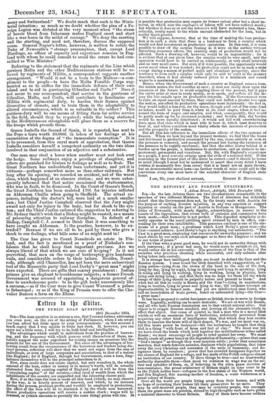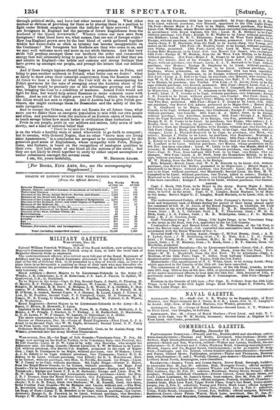TICE MINISTRY AN D FOREIGN ENLISTMENT.
1 Adam Street, Ade?phi, 19th December 1854. Sin—In the late debates there are two circumstances remarkable in the speeches of two different Ministers. The Earl of Aberdeen has definitely stated that the Government does not, by the treaty made with Austria for the purpose of curbing Russian injustice, in any way sanction or support injustice or cruelty on the part of Austria to Italians or Hungarians. The Duke of Newcastle, with manly dignity, acknowledges, in answer to the taunts of the Opposition, that errors both of omission and commission have been made,—that humanity is not perfect. This dignified simplicity is di- rectly opposite to the usual cavilling spirit evinced by men in office, con- tending for their own infallibility. This generous candour is one of the ele- ments of a great man' a greatness which Lord Derby's great man—the Czar—cannot achieve. Lord Derby's logic is anything but satisfactory. "The Czar is a great man, employing vast resources for unworthy purposes ; and we must obtain by our arms such advantages as to force the Emperor to submit to our terms of peace." If the Czar were a great good man, he would not do unworthy things with such resources; if a great bad man, he would scorn to submit at all, but would rather die in his extremity. The greatness of the Czar is that of the swindler who practises cheating while successful, and only submits after being taken into custody. It is strange how intelligent people are found to defend the Czar end the Russian system. I once heard the Irish described with exaggeration, as "a lying nation—lying from the crown of the head to the sole of the foot, lying by day, lying by night, lying in thinking and lying in speaking, lying in riding and lying in walking, lying in working, lying in playing, born lying and dying- lying ; and that there was no hope for them till the whole image of their lying should be palpably before and present to them." And what but all this in verity is Russia and the Czar ?—lying in negotiations, lying in treaties, lying itt peace and lying in war, till credence becomes an impracticability to honest men. And yet are intellectual men found, who call an incarnation of brute power, based on unbounded lying—the Czar— a great man ! It has been proposed to enlist foreigners as British troops to serve in foreign wars. Logically, nothing can be more desirable. We are at war with Russia, and all who hate Russian domination are to that extent natural allies. Our object is to cripple Russian mischief, and develop all the elements likely to effect that object. Our cause of quarrel is, that a man who is a moral idiot wields at will an enormous force of barbarians, sedulously prevented from acquiring any other kind of intelligence than that which may best enable them to execute the brute will of their despot. We war, and we must war on, till this brute power be destroyed—till the barbarians be taught that their idol is a thing "with front of brass and feet of clay." We must war till we have riven the bonds which hold together the multitudinous tribes called Russia ; we must encourage all people to rebel against her sway. We must finally crush all power based on the degradation of humanity,—power that uses "God's images" as though they were murrain cattle ; power that sometimes murders, that rends families asunder, displaces whole populations, that takes away the very Christian and surnames of the units of humanity, and de- signates them by numbers ; power that has crowded foreigners together on the shores of England for a refuge, and has made of the Polish refugees almost an institution of our country. If these things be true—and no trustworthy authority discredits them—then must we continue to wage war on the au- thor and upholder of them, or, if believing in the ultra peace doctrine of non-resistance, the proud aristocracy of Britain might in time come to be as the Polish nobles here—refugees in the free states of the Western world, and this England, this nursing-mother of freedom, a waste wilderness or a penal colony of Russia. Over all the world are people living away from their homes, and with no hope of revisiting their homes till their persecutors be no more. They may be self-deceived people, they may be crotchety people, but amongst them the great mass are patriots, stirred by high thoughts such as have given a national character to Great Britain. Many of them have become soldiers
through political strife, and have lost other means of living. What other method so obvious of providing for them as by placing them in a position to fight under British auspices against the inflicter of their sorrows ? What are foreigners in England but the parents of future Englishmen from the husband of the Queen downwards ? Whence comes our race save from foreigners ? what blood have we, what names, that are not of foreign origin ? How has England grown save by the beat blood of earth gathered together within her water-walls so often as tyranny has become insupportable on the Continent? Not foreigners but brothers are they who come to us, and we may well welcome more and more as our strife thickens. And this very strife will produce amongst these our brothers the order and consecutive energy that will ultimately bring to pass in their own lands all that they see and admire in England-the habits and customs and strong feelings that have grown up amongst our people, and prompt the letters that our soldiers write.
And if these foreign legions should happen to preponderate in Poles, and king to pass another outbreak in Poland, what better can we desire ? what 110 likely to draw away their conscript countrymen from the Russian ranks ? At times we hear a threat of what the Czar will do in emancipating his Polish movinoes for the sake of sweeping away the Austrian share of the spoil. That would be precisely one of the advantages growing out of the war, bringing the Czar to a condition of madness. Armed Poles would not fight for him, but would help armed Russians to make common cause with them. And so out of that might grow a new Poland, which the wisdom of the Allies would not seek to repress. And if Austria had to give Polish pro- vinces, she might exchange them for Bessarabia and the safety of the Da- nube navigation.
And to occupy the Crimea, and shut out Russia for all future time, what more can we desire than an energetic population to mix with our own people and allies, and perchance form the nucleus of an Eastern union of free states, to teach savage tribes how much better is civilization than barbarism ? Pride in our people, pride in our soldiers and sailors, lofty scorn of info- n'ority, and a kind of national belief that
"There be no men like Englishmen,"
is on the whole a healthy state of mind wherewith to go forth to conquest ; but to assume, with General Napier, that no other "brave men are living since Agamemnon," is a conclusion too arrogant to be countersigned by the generous good sense of Englishmen, whose sympathy with Poles, Hunga- rians, and Italians, is based on the recognition of analogous qualities to their own. God hath made of one blood all the nations of the earth ; but they are not likely to dwell together in unity by either unjust assumption or undue submission amongst the several races. I am, Sir, yours faithfully, W. BRIDGES ADAMS.



































 Previous page
Previous page